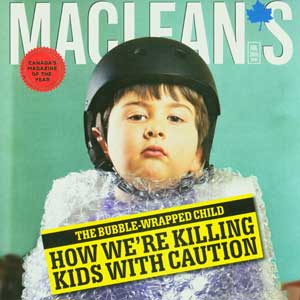 |
| CONTROVERSIAL? Dr. Michael Ungar's research was Maclean's February cover story. |
"It's been fun," says Michael Ungar about the whirlwind of media interviews he's recently completed. An associate professor in the School of Social Work, Dr. Ungar has written a new book that's generating headlines across the country, including a February cover story in Maclean's magazine. (Read: Q&A with Dr. Ungar in Maclean's.)
Too Safe For Their Own Good Ñ How Risk and Responsibility Help Teens Thrive elaborates Dr. Ungar's thesis that parents are misguidedly raising a generation of "bubble-wrapped children." It's an idea that's generating debate and discussion across the region and the country.
"We bubblewrap them in life jackets of programmed activities, larger and larger SUVs to shuttle them between those activities, and security cameras to watch them while they're there," says Dr. Ungar, the father of two children.
He adds that this approach can come with a price.
"We are overprotecting our kids to the point they feel unable to cope with life's challenges, because they've never had to deal with risk, responsibility or challenges of their own. Our excessive worry has become a risk factor for many children, denying them the same opportunities for adventure and responsibility we experienced when we were growing up."
Strength in adversity
With his 25 years in clinical psychology, Dr. Ungar's theories have their roots in studying children around the world who have suffered almost unimaginable adversity. The International Resilience Project (www.resilienceproject.org), based at Dalhousie, is looking at what makes children survive Ñ and even thrive Ñ despite enduring war, poverty, homelessness and abuse.
For parents, it's important to strike a balance between keeping our children safe, and offering them what they need to experience as part of the process of growing up, says Dr. Ungar.
One thing is for certain, and that is that solutions must begin with parents.
"To put it into context, I often ask parents 'What were you doing in terms of risk and responsibility and adventure-seeking behaviours when you were whatever age?' And then I ask them what they've learned from those experiences."
